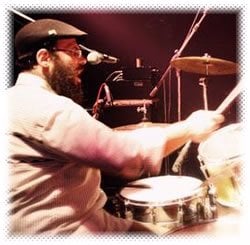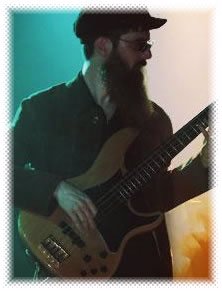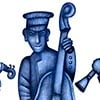King David is widely known as the "Sweet Singer of Israel." Medieval illuminations show him sitting placidly under a tree as he watches the flock, strumming his lyre and singing out his heart with praises and entreaties to his beloved Maker.
One imagines harmonious, lyrical sounds emanating as he strums, like those we would hear as a family tranquilly sings around the Shabbat table.
But David's eternal Psalms express more than spiritual serenity. The struggles, fleeing from mortal enemies, beseeching as he holds tenaciously onto G‑d amidst the crushing waves.
"You are my rock in a dry and scorching desert..." "Though I walk in the valley of death…" David cries from the depth of his soul.
Do gentle strums do justice to his angst? Perhaps the blues would best echo David's pain and triumph. Perhaps that lyre needs an amp and electrifying to better express his intense struggle, his dancing under the shadow of G‑d's wings, joyful in spite of it all!
Could an echo of David be heard in a rock n' roll, stamping and bogeying, high-volume band of three modern day Chassidic-Hendrix-Kabbalistic-electric-good time mix of nice Jewish boys called Yood?
These dynamic musicians use their rich musical backgrounds to connect with Jewish youth who may not relate to a rabbi or a Torah class. Their lively music, flavored with the fruits of their spiritual growth, unites kids of all backgrounds and gets them up and dancing. As Israeli music critic Yoav Friedman writes, "Yood's premier album, Passin' Over, is one of the new Jewish music's best. Turn up the volume. They aren't playing songs for the third Shabbat meal."
Meet the Trio

Lead guitar, harmonica and raspy vocals, Lazer Lloyd, was raised in Connecticut. "I grew up in a typical Reform home, with a strong Jewish flavor, but more emphasis on social justice than religion. In high school, my main interests were basketball and guitar," he says.
After high school, Lazer toured with his band, Legacy, focusing on the blues. He majored in music and composition at Skidmore College. A brush with the big times was exciting, when Lazer had the one in a million opportunity to make a demo for Atlantic Records in Nashville, but he ended up choosing to work in NYC as a songwriter.
"One of the guys at Atlantic was very perceptive," Lazer recalls. "He loved the music and said I could be big, but I have to decide who I am. He realized that my words aren't the normal words you'd associate with rock and roll. I wasn't aware of it, but there was this spiritual thing coming out. When I go back and listen I can hear it—there was a neshamah (soul) there looking for answers."
Around this time, Lazer was asked to play with Shlomo Carlbach. "Even though I hadn't even heard of him," Lazer continues, "I said sure. And that was it. I saw something deep and real. I couldn't just go back to what I was doing."
A seed had been planted and soon started sending up shoots, leading not only to spiritual growth and fulfillment, but a profound musical integration. "I had told Shlomo that the blues was my religion. But really, even though I love the music, I never found a personal connection with the lyrics.
"But once I heard Shlomo I felt a click. For the first time I had discovered my own blues, the Jewish blues."
Lazer finds a common musical thread between traditional blues music and Chasidic niggunim, soulful melodies.
"Early blues music and some niggunim share this stretch note—this note of yearning," he says. "For the blacks, it was a yearning for literal freedom—of the body. For the Chassidic rebbes who wrote these niggunim, it was a yearning for a freedom of the soul, from the constraints of the body.
Within a few months, I went to see Shlomo in Israel, where he found me a rabbi to study with. Some years later a kid on a bike, of all people, introduced me to Chabad, which opened up a whole new dimension of Jewish spirituality and vitality.
What we're doing with Yood is right in line with what the Rebbe taught," Lazer says. "Sometimes the most powerful things in the world have the potential to be both good and bad, and our job as Jews is to be holy—to use things like music, and even rock and roll, and make it into good."
Today Lazer is the proud father of five children, and lives in a suburb of Jerusalem. He has toured extensively with some of Israel's top bands, including the popular Reva L'Sheva, and played backup for Matisyahu. An Israeli music critic dubs him: "Jimi Hendrix with tzitzit."

Moshe Yankovsky keeps things moving with his tight beat. A world-renowned ethnic-fusion drummer, Moshe originates from Russia. For ten years he was big in power rock. Then, while playing on the flamenco scene in New York, he met up with some Russian Chabad guys. Getting burnt out with the music life, Moshe was looking for more. He got reinvigorated as he got more and more involved with his roots. Today he is married, living near Rehovot and the father of four children. In addition to playing with Yood he teaches drums and plays with other bands.

Yaacov Lefcoe, AKA Dr. Jake, on bass guitar, is the deep thinker of the group.
Originally from Canada, Yaacov spent his youth playing hockey, getting involved in antinuclear activism, and playing bass guitar. His soul searching found voice through his band, White Punks on Funk. Continuing his earnest search, he went on a 7-month solo trek through Thailand and India after high school, studying vipassana meditation. He finally discovered the treasures of his own heritage in Jewish mysticism, when a one night stay at Ascent Institute in Safed turned into a five year odyssey into the riches and depths of Torah.
Yaacov studied Kabbalah and Chassidic philosophy with one of the world's most highly regarded teachers, Rabbi Yitzchak Ginsburgh, in Shechem, Israel—among other teachers, mentors and friends.
Today the maverick father of 9 teaches classes in Torah and psychology, practices psychology from an office in Rosh Pina, and is finishing his Ph.D in clinical psychology. His award winning doctoral research focuses on meditation, the interaction of Judaism and psychology and the psychology of teshuvah (repentance).
From the tender age of ten, Yaacov has been a classic hard rock fan, influenced by Hendrix, Led Zepplin, Zappa, Pink Floyd and others in the genre. In high school he also got into Punk, New Wave, New Age dance music. Yaacov laughingly admits that the hard stuff is what really gets him. "I'm always a head-banger at heart. I listen to everything but whatever doesn't rumble through the chest like a freight train, it's a bit like it didn't happen... I'm a terminal case, I guess."
Like Lazer, Yaacov finds that niggunim are musically and spiritually something else. "The Chassidic wordless melodies – niggunim – are a class apart, pure Jewish soul music, raises everything else up. You have to get recordings without instruments though and they are hard to find. Best just to go and hang out with some Lubavitchers and get them to sing, the music is from another dimension completely. The related music of the Slonimer Chassidim is even harder to find but is absolutely a zone unto itself, a pure meditative state in sound."
Judaism in Most Unlikely Places
A nightclub might not seem the typical place to apply deep kabbalistic insights, but "there is no place devoid of Him." Yaacov tempers and guides the band's direction, relying not only on the musical intuition and emotions of these veteran musicians, but infusing his knowledge of Kabbalah into his playing, and guiding the direction of an improv. It sounds a bit heady, but audiences say they can sense that something bigger and deeper than just typical music is happening.

But mostly its just good music. "We keep the lyrics light," Lazer explains, "not too explicitly Jewish or preachy—we strive for a universal appeal." They put out a mix of rock 'n roll and blues, spiced with a country influence. Some are lyrical and personal, where others are get-up-and-dance music. Very alive, from the heart; it's enjoyable and real.
"I believe" is Lazer's favorite. A slowly building, country style song, its straight forward refrain, "And I believe…", sung with simple sincerity, renewed and sustained me in a period of personal cynicism and disillusionment. "And I believe in the power of a song… And I believe, there's hope within humility…" It healed me and reaffirmed for me that it's not naïve; it's good and whole and human and right to stand up and once again affirm, "And I believe."
Just by being themselves, family men living Jewish lives, but wielding mean guitars and drumsticks, Yood is busting clichés, forging connections.
Gaining Popularity
"We started playing together in 2000," Lazer says. "We have a widely appreciated style and sound, and try to be a bridge to non-observant Israelis, breaking down barriers and misunderstandings. We play regularly in Mike's Place in Tel Aviv, and all over the country. Ynet, an Israeli media outlet generally antagonistic toward the religious, gave us a great write up.
The divisive 2005 expulsion from Gush Katif reinforced the need for healing and finding common ground. "We just knew our work was one way to counteract what was going on in the country," Lazer explains. "Music brings people together. We wanted Jews to connect with each other again, and we wanted to help connect people to their spiritual roots."
Yaacov treasures being able to connect with people from many backgrounds. "Playing in non-religious contexts as a religious Jew and just having a normal conversation with people is itself a big thing at times, it breaks down so many barriers between Jews, especially in Israel," he says. "And of course there are opportunities to discuss spiritual things, Judaism. We see amazing things all the time."
Yood's popularity continues to spread. They have played before a crowd of 10,000 at Israel's Dead Sea Festival, and before 30,000 people at NYC's Israel Day Parade—the only band invited back to the parade for two consecutive years. This fall found them rockin' their way through a thirteen venue, nine state Chabad on Campus tour. And their new CD, titled Real People, came out about one month ago. The first song, called Wastin' Away, was dedicated to Gilad Shalit, an Israeli soldier held hostage by Hamas terrorists, with the hope and prayer that he return home safely and speedily.
Building bridges, making rapport and a good time are not just platitudes for these guys. Chaya Estrin, co-director of Chabad at the University of Washington had this to say. "We had Yood out to perform and spend Shabbat with our students. The students loved them, the band was so warm and interested in them, and just fun to hang out with. And they ROCKED, as all kinds of people, from Jewish students to frat boys passing by, were drawn into the outdoor concert."
Chaya's husband Elie comments, "They are not just great musicians, they are wonderful human beings. They care about people and everyone feels it."
They may be named after the smallest letter in the Hebrew alphabet, but Yood is making big waves and showing kids that being Jewish is happening, with their soaring, soulful riffs and tight sound.
Click here to listen to some of their music.
See also an article on Yood from our News section: Rock Band Inspired by Jewish Teachings Develops a Campus Following










Start a Discussion